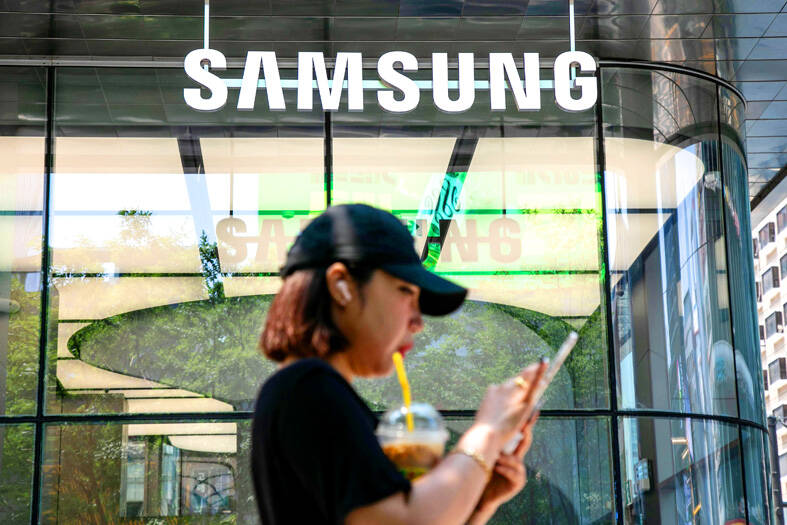A union representing tens of thousands of workers at South Korean tech giant Samsung Electronics Co yesterday said it would hold a three-day strike later this month after negotiations failed.
“Starting from July 8, we will stage a three-day general strike,” National Samsung Electronics Union vice president Lee Hyun-kuk said.
The union announced the strike late on Monday in a live YouTube broadcast, without providing the dates.

Photo: Bloomberg
The move follows a one-day walkout last month, the first such collective action at the company, which went decades without unionization.
Management at the company, the world’s biggest producer of memory chips, has been locked in negotiations with the union since January.
Workers have rejected the offer of a 5.1 percent pay hike, with the union having previously outlined demands including improvements to annual leave and transparent performance-based bonuses.
In calling for the strike, the union said that “management created this state” by failing to offer significant concessions.
“What will change if we do not act? Will you just watch and do nothing? Will you be a hidden slave or an active owner? Nothing will change if we do not act,” its statement said.
“All employees need to participate in the strike. Let’s step up and change it,” it said.
Samsung declined a request for comment.
Samsung Electronics avoided its employees unionizing for almost 50 years — sometimes adopting ferocious tactics, according to critics — while rising to become the world’s largest smartphone and semiconductor manufacturer.
Company founder Lee Byung-chul, who died in 1987, was adamantly opposed to unions, saying that he would never allow them “until I have dirt over my eyes.”
The first labor union at Samsung Electronics was formed in the late 2010s.

CHIP RACE: Three years of overbroad export controls drove foreign competitors to pursue their own AI chips, and ‘cost US taxpayers billions of dollars,’ Nvidia said China has figured out the US strategy for allowing it to buy Nvidia Corp’s H200s and is rejecting the artificial intelligence (AI) chip in favor of domestically developed semiconductors, White House AI adviser David Sacks said, citing news reports. US President Donald Trump on Monday said that he would allow shipments of Nvidia’s H200 chips to China, part of an administration effort backed by Sacks to challenge Chinese tech champions such as Huawei Technologies Co (華為) by bringing US competition to their home market. On Friday, Sacks signaled that he was uncertain about whether that approach would work. “They’re rejecting our chips,” Sacks

NATIONAL SECURITY: Intel’s testing of ACM tools despite US government control ‘highlights egregious gaps in US technology protection policies,’ a former official said Chipmaker Intel Corp has tested chipmaking tools this year from a toolmaker with deep roots in China and two overseas units that were targeted by US sanctions, according to two sources with direct knowledge of the matter. Intel, which fended off calls for its CEO’s resignation from US President Donald Trump in August over his alleged ties to China, got the tools from ACM Research Inc, a Fremont, California-based producer of chipmaking equipment. Two of ACM’s units, based in Shanghai and South Korea, were among a number of firms barred last year from receiving US technology over claims they have

BARRIERS: Gudeng’s chairman said it was unlikely that the US could replicate Taiwan’s science parks in Arizona, given its strict immigration policies and cultural differences Gudeng Precision Industrial Co (家登), which supplies wafer pods to the world’s major semiconductor firms, yesterday said it is in no rush to set up production in the US due to high costs. The company supplies its customers through a warehouse in Arizona jointly operated by TSS Holdings Ltd (德鑫控股), a joint holding of Gudeng and 17 Taiwanese firms in the semiconductor supply chain, including specialty plastic compounds producer Nytex Composites Co (耐特) and automated material handling system supplier Symtek Automation Asia Co (迅得). While the company has long been exploring the feasibility of setting up production in the US to address

OPTION: Uber said it could provide higher pay for batch trips, if incentives for batching is not removed entirely, as the latter would force it to pass on the costs to consumers Uber Technologies Inc yesterday warned that proposed restrictions on batching orders and minimum wages could prompt a NT$20 delivery fee increase in Taiwan, as lower efficiency would drive up costs. Uber CEO Dara Khosrowshahi made the remarks yesterday during his visit to Taiwan. He is on a multileg trip to the region, which includes stops in South Korea and Japan. His visit coincided the release last month of the Ministry of Labor’s draft bill on the delivery sector, which aims to safeguard delivery workers’ rights and improve their welfare. The ministry set the minimum pay for local food delivery drivers at